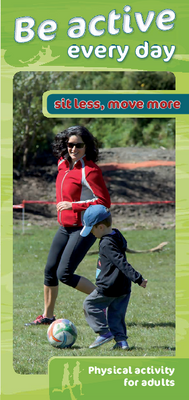Be active every day: Physical activity for adults HE2311

Information for adults on how much physical activity will help build health and well-being.
Please contact us if you would like a print-friendly PDF.
The full resource:
Be active
Do at least 2½ hours of moderate or 1¼ hours of vigorous physical activity spread throughout the week.
at least 2½ hours per week
Regular physical activity will help you to:
- have more energy
- lower your stress levels
- improve your posture and balance
- maintain a healthy weight
- keep bones and muscles strong and joints flexible
- feel more relaxed and sleep better
- reduce the risks of heart disease, obesity, strokes, type 2 diabetes, some cancers and depression
- live independently for longer.
For extra health benefits (including weight loss), do at least 5 hours of moderate or 2½ hours of vigorous physical activity spread throughout the week.
Aim for a mix of activities
Aerobic activities, such as brisk walking, swimming or dancing, will raise your heart rate and improve circulation of oxygen around the body.
Include activities to improve muscles and bone strength, such as climbing stairs, carrying shopping or children, waka ama or digging in the garden.
Sit less, move more, especially for long periods, eg, at your computer or in front of TV. Break up sitting and move for at least a few minutes every hour, preferably more.
Aim for mainly moderate and some vigorous activities and add muscle strengthening activities at least twice a week
Moderate
I'm breathing a bit harder, with a slightly increased heart rate.
I can hold a conversation.
- Brisk walking
- Biking on the flat
- Ballroom dancing, line dancing
- Raking the garden, trimming shrubs, hoeing
- Aqua aerobics
- Sports, eg golfing (carrying your bag), kapa haka
Vigorous
I'm breathing much harder, with a noticeably increased heart rate.
I can only say a few words without catching my breath.
- Jogging
- Biking faster than 16km per hour
- Dance aerobics
- Heavy digging, mowing with a hand mower, splitting logs
- Fast lap swimming
- Sports, eg netball, rugby, football, hockey
Muscle strengthening
Do muscle strengthening activities that work all 5 major muscle groups (arms, legs, chest, abdominals, back).- Push ups, sit ups
- Carrying heavy children/shopping
- Rock climbing, weight lifting, walking or cycling uphill, swimming
- Sports, eg, waka ama, rowing, kilikiti
Sit less, move more
- Break long periods of sitting.
- Move as much as possible during the day, eg, get off the bus early and walk, take the stairs, use housework to raise your heart rate (vacuum to music).
- You could do 30 minutes a day in 10-minute bursts.
- Walk or cycle to places in the fresh air.
- Walk children to school.
- Try out a sport or get back into one you enjoyed when younger.
- Be active with others – support will help to keep you motivated.
- Look for challenges in your area, eg, fun walks or runs.
- Do activities you enjoy – you’re more likely to stick with them.
Find additional tips, links and resources for getting going at www.health.govt.nz/yourhealth-topics/physical-activity
Doing some physical activity is better than doing none – even small increases in physical activity can produce measurable health benefits.
Getting started
Start slowly if you have been inactive for a long time. Build up to 2½ hours of moderate physical activity throughout the week by starting with smaller periods, eg, 5 or 10 minutes.
Your doctor or practice nurse can provide a Green Prescription (written advice on getting active and feeling better) and put you in touch with support to help you and keep you motivated.
Seek advice if you’re unsure about your health or how active to be. If you experience pain, dizziness or shortness of breath during your activity, stop and talk to your doctor.
Be active safely
- Wear appropriate clothing and footwear.
- Use sunscreen and wear a hat outdoors in summer.
- Use appropriate safety gear, eg, helmets for cycling, buoyancy aids when kayaking and dinghy sailing, life jackets when keel boating and fishing.
- Drink enough water.
Eat well and be active for a healthy lifestyle
Related resources
See the pamphlet Sit less, move more, sleep well
Older readers can find advice on physical activity for ages 65 years and older in Physical Activity for Older People Factsheet www.health.govt.nz/system/fi les/documents/ publications/physical-activity-for-older-people-factsheet-v2. pdf and in Ageing Well, HE1148 and at www.health.govt.nz/yourhealth-topics/physical-activity
Read more about healthy eating and regular physical activity in Healthy eating, active living and Eat healthy food and move more every day
Also see Healthy Weight for Adults, HE1324 and Eating for Healthy Older People/Te kai tōtika e ora ai te hunga kaumātua You can look at and order these, as well as other nutrition resources, at HealthEd
Additional information
The Ministry of Health
• www.health.govt.nz/yourhealth-topics/physical-activity
Green Prescriptions
• www.health.govt.nz/yourhealth-topics/physical-activity/green-prescriptions
New Zealand Physical Activity Guidelines
• www.health.govt.nz/our-work/preventative-health-wellness/physical-activity
Sport Smart
• www.acc.co.nz/preventing-injuries/playing-sport/sportsmart-10-point-plan/pi00111
Agencies for Nutrition Action
• www.ana.org.nz/resources/links
Sport New Zealand
• www.sportnz.org.nz